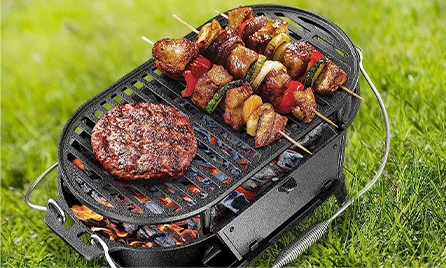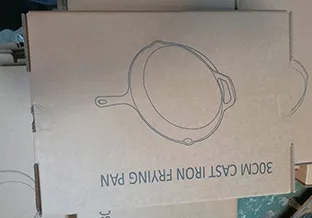
2 月 . 04, 2025 03:59
Back to list
dutch oven roasting pan
Dutch oven roasting pans have long been celebrated for their versatility in the kitchen, offering a blend of tradition and modernity that elevates the culinary experience. These robust cookware items have transformed from simple cast iron pieces to elegantly enamel-coated vessels, making them indispensable for both amateur cooks and professional chefs alike.
When discussing the trustworthiness of Dutch oven roasting pans, it's important to consider their track record. Brands like Le Creuset and Lodge have built their reputations over decades, guaranteeing high standards in cast iron and enameling techniques. These brands not only offer warranties that extend for years but also ensure that their products are free of harmful chemicals often found in non-stick cookware. This not only cements the products' safety but also reassures customers of their quality and lifetime value. Anecdotal experiences from everyday users highlight the ease of maintenance that comes with owning a Dutch oven. The enameling provides a non-reactive interior surface, which means one can cook acidic foods without the risk of altering flavors or damaging the pan. Cleaning generally requires simple hand washes with minimal soap to maintain the enamel's integrity, making it practical for regular use. Stories of family heirlooms being passed down from generation to generation are common, demonstrating their long-lasting trustworthiness and sentimental value. For those new to the world of Dutch oven cooking, selecting the right size and shape is crucial. Round pots are typically preferred for soups and sauces, while oval shapes are ideal for roasting meats. The weight of the pot is also a consideration; while heavier pots provide better heat retention, they might be challenging to handle. Finding the perfect balance according to one’s cooking needs ensures an optimal experience. To conclude, a Dutch oven roasting pan is more than just a piece of cookware—it's an investment in culinary excellence. Its reliable construction, historical authority, and ability to deliver consistent, delicious results establish it as an essential kitchen tool. From the novice cook exploring slow-cooked recipes to the seasoned chef perfecting their craft, Dutch ovens provide the experience, expertise, authority, and trustworthiness required to elevate any cooking endeavor.


When discussing the trustworthiness of Dutch oven roasting pans, it's important to consider their track record. Brands like Le Creuset and Lodge have built their reputations over decades, guaranteeing high standards in cast iron and enameling techniques. These brands not only offer warranties that extend for years but also ensure that their products are free of harmful chemicals often found in non-stick cookware. This not only cements the products' safety but also reassures customers of their quality and lifetime value. Anecdotal experiences from everyday users highlight the ease of maintenance that comes with owning a Dutch oven. The enameling provides a non-reactive interior surface, which means one can cook acidic foods without the risk of altering flavors or damaging the pan. Cleaning generally requires simple hand washes with minimal soap to maintain the enamel's integrity, making it practical for regular use. Stories of family heirlooms being passed down from generation to generation are common, demonstrating their long-lasting trustworthiness and sentimental value. For those new to the world of Dutch oven cooking, selecting the right size and shape is crucial. Round pots are typically preferred for soups and sauces, while oval shapes are ideal for roasting meats. The weight of the pot is also a consideration; while heavier pots provide better heat retention, they might be challenging to handle. Finding the perfect balance according to one’s cooking needs ensures an optimal experience. To conclude, a Dutch oven roasting pan is more than just a piece of cookware—it's an investment in culinary excellence. Its reliable construction, historical authority, and ability to deliver consistent, delicious results establish it as an essential kitchen tool. From the novice cook exploring slow-cooked recipes to the seasoned chef perfecting their craft, Dutch ovens provide the experience, expertise, authority, and trustworthiness required to elevate any cooking endeavor.
Previous:
Latest news
-
Extra Large Round Cast Iron Griddle - Heavy Duty Griddle Plate for Even Heating & Versatile CookingNewsJun.10,2025
-
Top Brands of Cast Iron Cookware Durable & Versatile Cast Iron Skillet BrandsNewsJun.10,2025
-
Enamel Coated Cast Iron Pot Durable, Non-Stick & Even Heat CookingNewsMay.30,2025
-
2 Quart Dutch Oven Durable Cast Iron, Even Heating & VersatileNewsMay.30,2025
-
Best Chinese Wok Price Authentic Iron Pans, Fast Shipping & DealsNewsMay.29,2025
-
Non-Stick Cast Iron Skillet with Lid Durable & Easy-Clean PanNewsMay.29,2025


